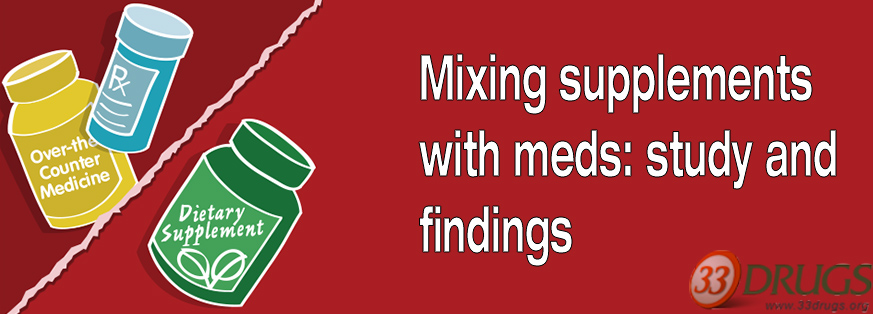One in three adults in the U.S. is taking both prescription medications and dietary supplements, creating a risk for dangerous interactions.
According to the National Center for Complementary and Alternative Medicine (NCCAM), a dietary supplement can be a vitamin, a mineral, an herb or other botanical, an amino acid, or other such substances or their constituents. These supplements have demonstrated pharmacologic action used to produce therapeutic results. Even supplements that do not have a documented pharmacologic action can affect the absorption, metabolism, and disposition of other drugs. As with many drug-drug interactions, the information for many dietary supplements is deficient and sometimes supported only by case reports. Deleterious effects are most pronounced with anticoagulants, cardiovascular medications, and oral hypoglycemics.
Results of the study.
“Multivitamins (multivitamins with added ingredients like herbs or fish oil were the most common form of supplement mixed with medications) are commonly assumed to be safe, but our analysis suggests multivitamins, which may include multivitamin ‘plus’ combination products, can also contain botanical and herbal ingredients that have the potential to interact with prescription medications,” Harris Lieberman (the study’s senior author, is a researcher with the Military Nutrition Division of the U.S. Army Research Institute of Environmental Medicine (USARIEM) in Natick, Massachusetts).
The researchers focused on 10,480 adults (4,934 women who were not pregnant and 5,016 men) who answered survey questions about their dietary supplement and prescription medication use, as well as whether they had any of the following medical conditions: asthma, arthritis, congestive heart failure, coronary heart disease, angina, heart attack, stroke, high blood pressure, high cholesterol emphysema, chronic bronchitis, cancer, weak bones or problems with the liver, thyroid or kidneys.
The researchers found that 47 percent of participants diagnosed with any of those medical conditions used both supplements and prescription medications. That compared to about 17 percent of adults who didn’t have those conditions but were taking prescription medications for other reasons, such as birth control pills or antidepressants.
Overall, 34 percent of the participants – representing some 72 million people in the U.S. – were taking some kind of dietary supplement along with prescription medication.
Cardiovascular medications were most likely to be used along with dietary supplements, followed by central nervous system agents, hormones, metabolism-related drugs, psychotherapeutic agents, and antibiotics or antivirals.
Multivitamins containing other ingredients were more common than standard multivitamins. The ingredients most often added to the enhanced multivitamins included fish oil, botanicals, herbs, probiotics, fiber, enzymes, antacids and glucosamine, and chondroitin.
Supplement use was most common among people with diagnosed osteoporosis, followed by those with thyroid, cancer, arthritis, cardiovascular, kidney, diabetes, respiratory, and liver conditions.
The authors call the findings “concerning” because some herbal supplements are known to alter the way the liver metabolizes drugs and can increase or weaken the potency of the medication.
“Patients, especially those taking medications or given new prescriptions, should always inform their doctors about what dietary supplements they are taking, and doctors can help patients by asking about their supplements,” Lieberman said.
Lieberman added that if a patient is concerned, then bringing the supplement’s original container will help doctors and other healthcare providers identify ingredients in supplements that have the potential to interact with medications.
“Patients can also use reputable sources to check if there have been reports about interactions of dietary supplements they are considering taking and their medications.”
Regulation of Dietary Supplements.
Dietary supplements are not subjected to the same rigorous safety and efficacy trials and premarketing approval process required of prescription drugs. As a result, there is often incomplete knowledge regarding interactions between dietary supplements and drugs, especially among patients with chronic diseases.
Marketed products containing dietary supplements may vary significantly. Even different batches of the same product from the same manufacturer may differ in content and potency. Previously in the United States, dietary supplement products may not have contained what they were labeled to contain. However, in June 2007 the U.S. Food and Drug Administration (FDA) released “good manufacturing practices” for the dietary supplement industry.
Types of Interactions.
Interactions with dietary supplements can be of two types. Pharmacodynamic interactions occur when the intrinsic action of a dietary supplement augments or antagonizes the activity of another drug. Pharmacokinetic interactions result from changes in metabolism, excretion, or (infrequently) absorption or protein binding of the active aspect of the dietary supplement or the drug, resulting in a more pronounced or diminished pharmacologic activity.
The evidence supporting dietary supplement–drug interactions, just as with drug-drug interactions, varies widely.
General Considerations with Dietary Supplements.
Anybody who is taking prescription medication should be telling their doctor everything they’re taking so that a judgment can be made whether there is, or might be, an issue, also pharmacists may be a good source of information on medications and dietary supplements, but she doesn’t think that should be a substitute for speaking with a doctor.
Physicians should advise patients about the safety and effectiveness of the products they are using or are considering using. Most patients do not realize the great variability among dietary supplements.
Two out of three patients taking prescription medications and supplements do not tell their physician about their dietary supplement use, perhaps because they do not consider supplements to be legitimate drugs or to carry risks. Therefore, all patients should be asked about their use of dietary supplements. Rather than closed, yes or no questions, physicians should ask, “What vitamins, herbs, and other supplements do you use? What about teas, tinctures, or natural products?” These supplements should be treated like other drugs and recorded in the patient record.

Leave a Reply